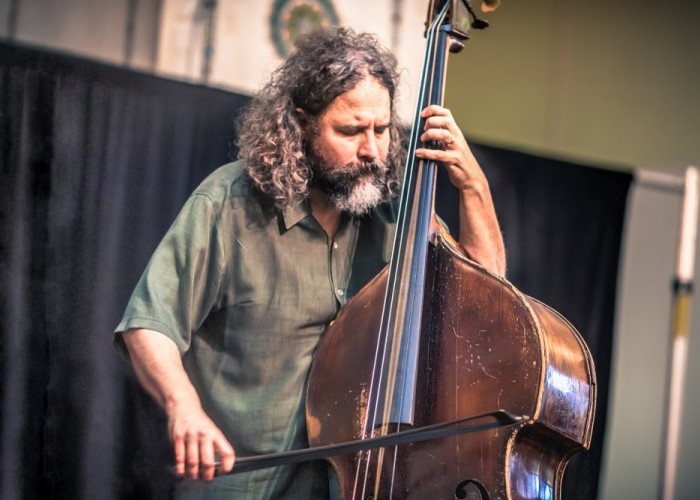Jan 13, 2026 2:09 PM
More Trump-Kennedy Center Cancellations
The fallout from the renaming of the John F. Kennedy Center for the Performing Arts to include President Donald…

Joshua Abrams performs Sept. 2 with the Jason Stein Quartet at Millennium Park during the Chicago Jazz Festival.
(Photo: Michael Jackson)Joshua Abrams wants a refill on his coffee.
Backlit by afternoon sun streaming into Groundswell Coffee Roasters on the northside of Chicago, the multi-instrumentalist and composer seems to closely consider every phrase he utters. Ten-second pauses preface Abrams’ replies to questions about his sprawling career and latest release, Excavations I, a disc’s worth of solo bass maneuvers issued on Feeding Tube Records.
“It’s not a revelation, it’s experimentation,” he said about the album. “I do like what happens when you flip to the second side; it gets extra thick.”
He calls jazz an elusive thing while detailing his work across a diverse range of ensembles, including The Natural Information Society (a troupe sporting a handful of releases on the Eremite label on which Abrams plays guimbri, a stringed instrument with provenance in North Africa), Town and Country, Sticks and Stones, as well as contributions to The Roots’ first pair of full-lengths.
In a wide-ranging conversation, Abrams mentions guitarist Derek Bailey, bassist Jimmy Garrison, experimental musician Kevin Drumm and percussionist Tatsuya Nakatani as having influenced him, despite the dissimilarities among the recordings of each player. Then there’s his work on Steve James’ documentaries, the bassist having contributed music to The Interrupters, Abacus: Small Enough To Jail and America To Me, a 10-part documentary series on Starz detailing a year at Oak Park and River Forest High School in suburban Chicago.
But what it all seems to get down to is Abrams looking for free range of motion, regardless of genre, his collaborators or the strictures of trying to live a life predicated on the performance of creative music.
The following has been edited for length and clarity.
Is the solo record a purposeful attempt to do something completely separate from Natural Information Society?
This endeavor is focused on working on a solo practice, and my instrument of greatest fluency is bass—so some of it is that. It’s me working out solo playing and in doing so, then it’s kind of contributing to the legacy of the instrument.
I’m interested in dealing with playing solo, and this was the first step of making a record of that. I’ve made some records by myself, but I haven’t done one where it was literally a document of me playing solo. Some early ones on Lucky Kitchen, there was maybe some of that, but also some sound pieces and stuff like that.
The practices are ongoing—this is ongoing. The music on [Excavations 1] was recorded in 2012. I mean, it’s still things I’m concerned with, and because I don’t get to play solo frequently, it’s sort of something that I’ve been working on more at home and presenting once in a while, putting it out into the world. It’s not under the moniker of Natural Information Society—that’s a somewhat specific idea. The two could meet—and even have met; I’ve played bass in Natural Information Society, and we get into some of the more, let’s say, thicker improvised areas once in while.
Your bass on Excavations I doesn’t seem like it’s processed. How’d you decide to record that way?
It is acoustic bass. Sometimes I played with a little bit of distortion mixed in through a pedal, but also mixed mostly with a microphone signal. It’s sort of all just different ways of trying to hit the tape and make it respond in different ways. I’ve done things where I dub stuff out, but I didn’t want to do that; I wanted it to be more of a record of something happening.
Another thing with this record that I wanted to focus on: There are so many small textural and timbral details that I’ve come to know and appreciate, I just wanted to start creating a setting for that. It’s difficult to do that with other instruments; it covers it up. This is more about creating a space and exploring that space. It takes time, and usually, those things are within the context of a song or a greater improvisation. Some of the sounds are so subtle, it would be hard to improvise with many other musicians, if I was just using those songs. Maybe if I figure out how to hyper-amplify them—the harmonic details and real nuanced things, the little grainy textures—wouldn’t get covered up.
It’s not about a virtuosic display or a technical display. Or even the whole thing as a record.

Belá Fleck during an interview with Fredrika Whitfield on CNN.
Jan 13, 2026 2:09 PM
The fallout from the renaming of the John F. Kennedy Center for the Performing Arts to include President Donald…

Peplowski first came to prominence in legacy swing bands, including the final iteration of the Benny Goodman Orchestra, before beginning a solo career in the late 1980s.
Feb 3, 2026 12:10 AM
Ken Peplowski, a clarinetist and tenor saxophonist who straddled the worlds of traditional and modern jazz, died Feb. 2…

The success of Oregon’s first album, 1971’s Music Of Another Present Era, allowed Towner to establish a solo career.
Jan 19, 2026 5:02 PM
Ralph Towner, a guitarist and composer who blended multiple genres, including jazz — and throughout them all remained…

Rico’s Anti-Microbial Instrument Swab
Jan 19, 2026 2:48 PM
With this year’s NAMM Show right around the corner, we can look forward to plenty of new and innovative instruments…

Richie Beirach was particularly renowned for his approach to chromatic harmony, which he used to improvise reharmonizations of originals and standards.
Jan 27, 2026 11:19 AM
Richie Beirach, a pianist and composer who channeled a knowledge of modern classical music into his jazz practice,…